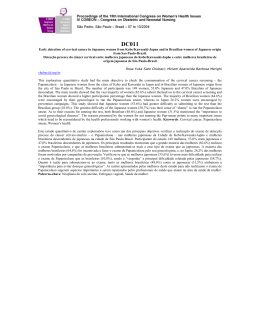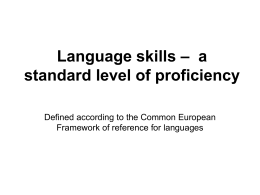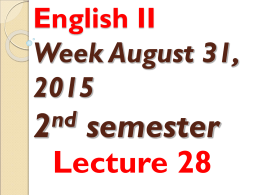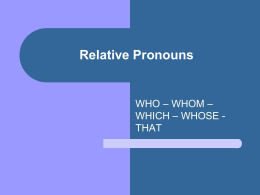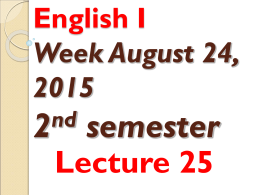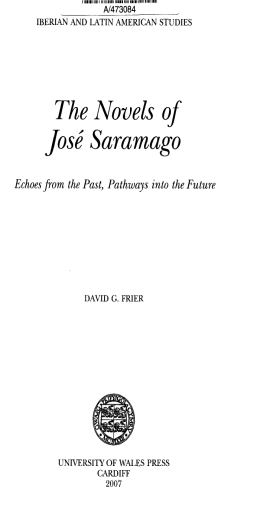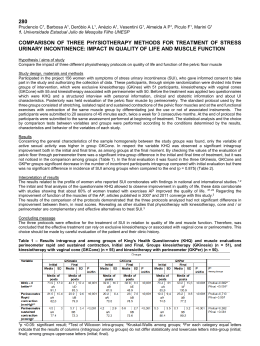ATIVIDADES DE RECUPERAÇÃO PARALELA – 3º Trimestre 3º EM DISCIPLINA: Inglês Observações: 1- Antes de responder às atividades, releia o material entregue sobre Sugestão de Como Estudar. 2 - Os exercícios devem ser resolvidos em folha timbrada e entregues no dia da Prova de Recuperação. Conteúdo: Apostilas 5, 6 e7 EXERCÍCIOS: 1. Choose the appropriate words to complete the CONDITIONAL SENTENCES: a) They _______ Tina if she ________ complaining about them again. ( ) would have helped / starts ( ) won’t / starts ( ) may / should have started ( ) N.O.T. (none of these) b) If Bill _______ the problem you caused, we _______ him. ( ) had not known / will have ( ) knows / could ( ) didn’t know / may tell told tell ( ) N.O.T. (none of these) c) If Marcy _______ me yesterday, I _______ her what you did to her dog! ( ) had called / would have told ( ) calls / will tell ( ) would call / have told ( ) N.O.T. (none of these) 2. Use the appropriate expressions to complete the following sentences: a) We never go to the theater by bus; Barney ______________. ( ) doesn’t too ( ) neither does ( ) doesn’t either b) Katie won’t be at the party with us; ______________ Jack. ( ) so will not ( ) nor won’t ( ) neither will c) I have read “Romeo and Juliet” twice; Pablo ______________. ( ) has neither ( ) so has ( ) has too 1 3. Write the following sentences in the PASSIVE VOICE: a.People say that we are hard workers. b.People believed that the movies were bad. 4.Read the texts and write, in Portuguese, the main ideas. Text 1: (FAFI – MG) One of Billy’s baby teeth bothered him. Since he wouldn’t let his father try the old string and doorhandle method, a visit to the dentist was the only alternative. The dentist had no trouble extracting it. In fact, Billy didn’t even feel it coming out. But when he saw the tooth in the dentist’s forceps, he let out a terrible screech. “That will be five dollars,” said the dentist when he saw Billy’s father fetch out his wallet. Now it was the father’s turn to yell. “Five dollars! That’s too much, isn’t it? I thought it would be only a dollar.” “It would have been” replied the dentist, “if the boy’s shouts hadn’t scared four customers from the office.” Text 2: North Carolina executes killer of six Friday, October 22, 2004 Posted: 10:50 AM EDT (1450 GMT) RALEIGH, North Carolina (AP) -- A man convicted of six slayings in one of the worst killing sprees in North Carolina history was executed early Friday. Charles Wesley Roache, 30, had dropped all but a mandatory appeal on the trial record required by state law. Legal wrangling could have extended his life for up to five years, but Roache said he gave up all appeals to show his remorse to the survivors of his victims. He was pronounced dead at 2:18 a.m. of lethal injection.Death penalty opponents argued the state shouldn't execute Roache without examining his mental fitness, but Roache asked his lawyers to do nothing to keep him alive. He also declined to seek clemency from Gov. Mike Easley, who decided Thursday night that he saw no reason to stop Roache's execution.Roache and Christopher Wayne Lippard, 25, were convicted in the September 29, 1999, shooting death in Alexander County of Chad McKinley Watt, 22. The pair then headed west to Haywood County in a stolen pickup truck. A day later, after that vehicle was struck, they went to a home near Interstate 40 to steal a car.The Phillips family returned home from the Haywood County Fair during the robbery attempt. Earl Phillips, 72; his wife, Cora, 71; their son, Eddie, 40; daughter-in-law Mitzi, 44; and granddaughter Katie, 14, were killed. Lippard was sentenced to life in prison at a separate trial. Roache was the third person executed in North Carolina this year and the 33rd executed in the state. 5. Choose the correct answer: New Language Discovered in India, Race is On to Preserve It A group of American linguists just announced the discovery of a new language in a remote region of India. The language, called Koro, was discovered during a 2008 expedition to Arunachal Pradesh, according to a local newspaper. 2 The interesting thing about the discovery of Koro is that it was “hiding in plain sight.” Koro speakers are part of the Aka culture, and live in villages where most of their neighbors speak Aka. While the two languages are in fact very different, Koro and Aka speakers consider themselves one people, and treat Koro as if it were a dialect of Aka, instead of a “distant sister,” as the linguists described it. It should be noted that there is some controversy over whether or not Koro is in fact a new discovery. According to the newspaper Telegraph, linguists from the Assam chapter of Indian National Trust for Art and Cultural Heritage are claiming that Koro was known to Indian linguists before the American linguists documented it. Whether it’s really a “new” language or not, Koro only has between 800 and 1,200 speakers, so now the race is on to try and preserve it, if possible. A language dies out about every two weeks, and language preservation expert Tabu Ram Taid told our newspaper that: “Koro might have met the same fate. But the point is now to preserve Koro. Apart from speaking, one must develop writing the language to prevent it from vanishing.” (Adaptado de: <http://blog.k-international.com/new-language-discovered-in-india/> Acesso em: 12 out. 2010.) 1. De acordo com o texto, é correto afirmar: a) Os linguistas divergem sobre a autoria da recente descoberta da língua Koro. b) Os vilarejos em regiões remotas da Índia têm entre 800 e 1.200 habitantes. c) As línguas Koro e Aka foram identificadas e descritas por linguistas em 2008. d) Os falantes atuais da língua Aka poderão deixar de usá-la na forma escrita. e) Os dialetos e línguas falados em Arunachal Pradesh se tornaram extintos. 2. Na expressão “race is on to preserve it”, it se refere a: a) expedition. b) India. c) race. d) language. e) region. 3. Tabu Ram Taid é apresentado no texto como: a) falante de um dialeto. b) jornalista indiano. c) originário de Assam. d) tradutor da língua Aka. e) estudioso de línguas. INTERVIEW WITH KATTY KAY, CO-AUTHOR OF WOMENOMICS Speak Up features an interview with Katty Kay, the BBC‟s Washington correspondent. She is also the co-author, with Claire Shipman, of the book, Womenomics: Write Your Own Rules for Success. We asked her about the book: Katty Kay: The book talks about the power that women have in the workplace. We did research which showed that the more senior women a company employs, the more money they make. And we’re arguing in the book that a lot of women don’t realize how much value they have in the economy, how much influence they have in their companies, and that they can use… we think they can use that value and that influence to try to get more time, to work more flexibly, because a lot of women, professional women, find that, when they have children, it’s very difficult to do the 60-hour week careers that American life, and professional life, demands. And what we’re saying is, “Listen, you are very valuable to your company: you might not know that you are very valuable, but you are very valuable, you bring in money. Now you can go to your boss and say, „I need to work more flexibly. You want to keep me? You need to let me work in the way that I want to 3 work.‟” And actually, companies that have let women work more flexibly, find great results. So we argue that this is a very good time for women to be in the workforce, it’s a very powerful time for women to be in the workforce, and that they can change the way that they want to work. Disponível em: <http://www.speakup.com.br/extras/ed270/exed270a.html>. Acesso em: 22 jun. 2010. 1. Em relação às mulheres, o livro de Katty Kay discute: a) a facilidade com que cumprem suas horas semanais. b) o preconceito sofrido por elas nas empresas. c) a importância da licença maternidade. d) o poder que elas exercem no local de trabalho. e) o poder que elas exercem em casa. 2. A pesquisa realizada pelas autoras mostrou que: a) as mulheres experientes trazem mais lucro para as empresas. b) os chefes mais antigos são compreensivos com as mulheres. c) os filhos impedem que as mulheres cumpram a carga horária. d) as empresas investem recursos na capacitação das mulheres. e) as mulheres experientes não trazem lucros para as empresas. 3. Ao sugerir que as mulheres questionem seu papel nas empresas, Katty Kay pretende: a) despertá-las para a sua importância profissional. b) motivá-las a pedir aumento de salários. c) elogiá-las pela forma como se portam no trabalho. d) estimulá-las a diversificar suas carreiras. e) a e d estão corretas. 4. A conclusão da autora em relação ao momento atual é que as mulheres podem: a) alterar o modo como querem trabalhar. b) auxiliar na seleção de equipes femininas. c) concorrer a cargos de chefia. d) incentivar suas colegas de trabalho. e) todas as alternativas estão incorretas. 4
Download

